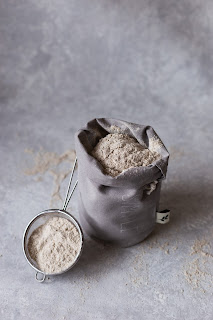Flour Power: How to Choose the Perfect Flour for Your Pizza
The heart of any good dough is the flour used. Some flours are 'stronger' than others, but each serve their purpose. Think of flour (as soon as it is hydrated) as a spectrum between a balloon and a car tire.
Think of lower protein (and W rated) flours as a balloon, and higher protein (and W rated) flours as a car tire. It will be easier to inflate a balloon than a car tire, but after a while, too much inflation will cause it to 'pop' and deflate, while inflating a car tire, it will require more inflation to fill, and even more so before it overinflates. The name of the game is matching your fermentation to suit your flour, or vice versa. Below is a list of my favorite flours! With proper handling, each one can handle more fermentation than mentioned, I just listed what I prefer for each flour =)
There are two main proteins in flour, glutenin and gliadin, when they come in contact with water, they form gluten bonds. In a sense, the higher the protein %, the more gluten will be formed when it is hydrated. However, glutenin > gliadin in gluten formation, so if a flour is 15% protein, but the majority of the protein is gliadin, it could be weaker than say, a 12% protein flour, that is primarily glutenin.
A W rating is a more accurate measure of how strong a flour is, however, this method that involves an alveograph, creating and inflating a doughball until it 'pops', and is usually only measured in flours outside of the United States. The more resistance the flour can handle, the higher the W rating.
Comment with questions or anything related!
Caputo Pizzeria Flour: https://amzn.to/44ZeDsw
- Protein Content: Approximately 12.5%.
- W Rating: W 260-290.
- Recommended Fermentation Times:
- Room Temperature: Up to 24 hours.
- Controlled Temperature: Up to 48 hours.
- Contains Malted Barley Wheat (Diastatic Malt Powder): No.
- Uses: Ideal for classic Neapolitan-style pizza with a light, airy crust. Short fermentation times are recommended.
Caputo Nuvola: https://amzn.to/3QjGqPV (Nuvola Super, higher W and protein %)
- Protein Content: Approximately 12.5%.
- W Rating: W 300-330.
- Recommended Fermentation Times:
- Room Temperature: Up to 24 hours.
- Controlled Temperature: Up to 48 hours.
- Contains Malted Barley Wheat (Diastatic Malt Powder): No.
- Uses: Versatile flour suitable for various pizza styles, including Neapolitan and Roman, with longer fermentation times.
Caputo Americana: https://amzn.to/3QeiZHX
- Protein Content: About 14.25%.
- Estimated W Rating: 360-380
- Recommended Fermentation Times:
- Room Temperature: Up to 48 hours.
- Controlled Temperature: 96 hours or more.
- Contains Malted Barley Wheat (Diastatic Malt Powder): Yes.
- Uses: Versatile all-purpose flour suitable for various pizza styles, bread, and pastries. Longer fermentation times are possible.
Caputo Manitoba Oro: https://amzn.to/3q9ezaz
- Protein Content: Approximately 15.5%.
- W Rating: W 360-380.
- Recommended Fermentation Times:
- Room Temperature: Up to 48 hours.
- Controlled Temperature: Up to 96 hours.
- Contains Malted Barley Wheat (Diastatic Malt Powder): No.
- Uses: Excellent for hearty and rustic bread, sourdough loaves, baguettes, and artisanal pizzas with extended fermentation times.
Caputo Chef's Flour (Cuoco): https://amzn.to/3rUlvco
- Protein Content: Approximately 12.5%.
- W Rating: W 220-240.
- Recommended Fermentation Times:
- Room Temperature: Up to 24 hours.
- Controlled Temperature: Up to 48 hours.
- Contains Malted Barley Wheat (Diastatic Malt Powder): No.
- Uses: Versatile "00" flour for various Italian cuisine applications, including pizza, pasta, and focaccia.
General Mills All Trumps Flour: https://amzn.to/3OCtxiE
- Protein Content: Approximately 14.2%.
- Estimated W Rating: n/a (W rating for General Mills flour is not readily available).
- Recommended Fermentation Times:
- Room Temperature: Up to 36 hours.
- Controlled Temperature: 72 hours or more.
- Contains Malted Barley Wheat (Diastatic Malt Powder): Yes.
- Uses: Preferred by professional pizzerias for sturdy and chewy pizza crusts, allowing for longer fermentation times.
- BLEACHED AND BROMATED, great flour, but I would not recommend using with
- natural leavening such as sourdough.
King Arthur Sir Lancelot Flour (KASL): https://amzn.to/3qcs2hY
- Protein Content: Approximately 14%.
- Estimated W Rating: n/a (W rating for King Arthur flours is generally not provided).
- Recommended Fermentation Times:
- Room Temperature: Up to 36 hours.
- Controlled Temperature: 72 hours or more.
- Contains Malted Barley Wheat (Diastatic Malt Powder): Yes.
- Uses: Excellent for artisan bread and pizza crusts, especially bagels, with strong gluten development.
King Arthur Bread Flour (KABF): https://amzn.to/3OwS4FX
- Protein Content: About 12.7%.
- Estimated W Rating: n/a (W rating for King Arthur flours is generally not provided).
- Recommended Fermentation Times:
- Room Temperature: Up to 24 hours.
- Controlled Temperature: Up to 48 hours.
- Contains Malted Barley Wheat (Diastatic Malt Powder): Yes.
- Uses: Versatile flour suitable for various bread recipes and pizza dough with shorter fermentation times.

.jpg)

Comments
Post a Comment